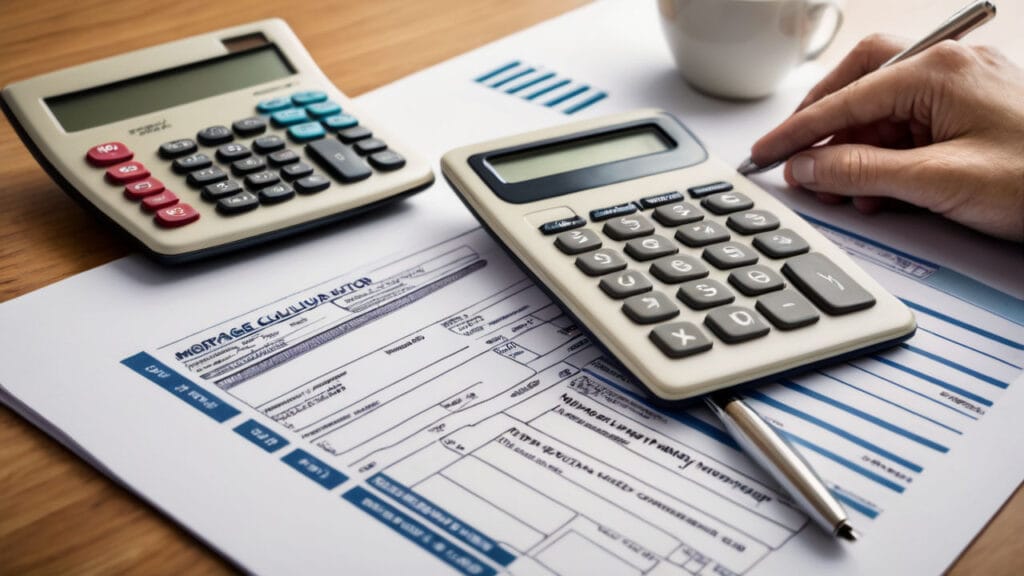mortgage calculators: In the labyrinth of home financing, a mortgage calculator serves as a guiding light. It’s more than just a tool & it’s a gateway to understanding how your future home fits into your financial puzzle. Whether you’re a first-time homebuyer or a seasoned property investor, the importance of a mortgage calculator cannot be overstated. It demystifies the numbers, allowing you to approach your home buying journey with clarity and confidence. This guide will walk you through the essentials, showing you how to leverage this powerful tool to make informed, strategic decisions.

What Is a mortgage calculator?
At its core, a mortgage calculator is a digital tool designed to estimate your potential mortgage payments. By inputting variables such as the loan amount, interest rate, and loan term, it provides a snapshot of what your monthly obligations might look like. But a mortgage calculator is more than just a simple arithmetic device. It’s a sophisticated financial model that factors in complex variables like amortization schedules and varying interest rates, giving you a realistic picture of your future financial commitments. Understanding how it works is the first step toward using it effectively.
Why Every Homebuyer Needs a mortgage calculator
Purchasing a home is likely the most significant financial decision you’ll ever make. The stakes are high, and the margin for error is slim. A mortgage calculator is your first line of defense against costly mistakes. It empowers you to see beyond the sticker price of a home and understand the true cost of ownership. By simulating different scenarios, you can gauge how changes in interest rates or down payments will affect your monthly budget. In essence, it allows you to make data-driven decisions, reducing the uncertainty that often accompanies the home buying process.

The Evolution of mortgage calculators: From Pen and Paper to Digital Tools
The concept of calculating mortgage payments isn’t new. Before the advent of digital tools, potential homebuyers would manually calculate their payments using complex formulas and financial tables. This process was not only time-consuming but also prone to errors. The digital revolution transformed this process, introducing mortgage calculators that could perform these calculations in seconds with impeccable accuracy. Today, these tools have evolved into sophisticated online platforms that can handle a myriad of variables, from adjustable-rate mortgages to extra payment scenarios, providing users with a comprehensive view of their financial obligations.
Key Benefits of Using a mortgage calculator
The benefits of using a mortgage calculator extend beyond simple payment estimates. Firstly, it enhances your financial literacy by breaking down complex mortgage concepts into understandable terms. Secondly, it allows you to explore various loan scenarios without any commitment, giving you the flexibility to make informed decisions. Thirdly, it can help you identify the best loan products by comparing different options side by side. Lastly, it serves as a reality check, ensuring that you’re not overextending yourself financially. In sum, a mortgage calculator is an indispensable tool for anyone serious about making a sound investment in real estate.

TAKING in Mortgage Basics
How a Mortgage Works: Principal, Interest, and Amortization
To fully appreciate the power of a mortgage calculator, it’s crucial to understand the basic components of a mortgage. The principal is the amount you borrow, while the interest is the cost of borrowing that money. Amortization refers to the process of paying off the loan over time, where each payment is divided between reducing the principal and covering the interest. In the early years of your mortgage, a larger portion of your payment goes toward interest, but as time progresses, more of your payment is applied to the principal. This interplay between principal, interest, and amortization forms the backbone of any mortgage calculation.
Fixed-Rate vs. Adjustable-Rate Mortgages: What’s the Difference?
Mortgages generally come in two flavors: fixed-rate and adjustable-rate. A fixed-rate mortgage locks in your interest rate for the life of the loan, providing stability and predictability in your payments. On the other hand, an adjustable-rate mortgage (ARM) offers a lower initial interest rate that can fluctuate based on market conditions. While ARMs can offer savings in the short term, they also come with the risk of higher payments down the line. Understanding the difference between these two types is essential when using a mortgage calculator, as the type of mortgage you choose will significantly impact your calculations and long-term financial strategy.
TAKING in Interest Rates and How They Affect Your Mortgage
Interest rates are a critical factor in determining your mortgage payments. Even a small change in interest rates can have a significant impact on the total cost of your loan. When interest rates are low, your payments will be lower, making homeownership more affordable. Conversely, higher interest rates can significantly increase your monthly payments, potentially stretching your budget thin. A mortgage calculator allows you to see how different interest rates affect your payments, helping you determine the best time to buy or refinance a home.
The Impact of Loan Term on Your Mortgage Payments
The loan term, or the length of time you have to repay your mortgage, is another crucial factor in determining your payments. A shorter loan term, such as 15 years, will result in higher monthly payments but lower overall interest costs. A longer loan term, like 30 years, will reduce your monthly payments but increase the total interest paid over the life of the loan. By adjusting the loan term in a mortgage calculator, you can see how it affects your payments and decide which option best fits your financial goals.
How Down Payments Influence Mortgage Calculations
Your down payment plays a significant role in determining your mortgage payments. The more you can put down upfront, the less you’ll need to borrow, which translates to lower monthly payments and less interest paid over time. Additionally, a larger down payment can help you avoid private mortgage insurance (PMI), which is required when you put down less than 20% of the home’s purchase price. A mortgage calculator can show you how different down payment amounts affect your monthly payments and total loan cost, helping you determine the best strategy for your financial situation.
Read More : Mortgage Points: A Complete Guide
Types of mortgage calculators
Basic Mortgage Payment Calculator: A Simple Tool for Quick Estimates
The basic mortgage payment calculator is the simplest tool available, designed to provide a quick estimate of your monthly payments based on the loan amount, interest rate, and loan term. This type of calculator is ideal for getting a rough idea of what you can afford, but it doesn’t account for additional factors like taxes, insurance, or PMI. While it’s a useful starting point, more advanced calculators are needed for a comprehensive analysis.
Advanced mortgage calculator: Delving into Detailed Calculations
An advanced mortgage calculator takes things a step further by allowing you to input more detailed information, such as property taxes, homeowners insurance, and PMI. It can also accommodate different loan types, including fixed-rate, adjustable-rate, and interest-only mortgages. This type of calculator provides a more accurate picture of your monthly payments and overall loan cost, making it an essential tool for serious homebuyers.
Interest-Only mortgage calculator: When and How to Use It
An interest-only mortgage calculator is a specialized tool that helps you calculate payments for an interest-only loan, where you only pay the interest for a set period before the principal repayment begins. This type of loan can be beneficial in certain situations, such as when you expect your income to increase in the future or plan to sell the home before the interest-only period ends. However, it’s crucial to understand the risks involved, as your payments will increase significantly once the principal repayment begins.
Refinance mortgage calculator: Should You Refinance?
A refinance mortgage calculator helps you determine whether refinancing your current mortgage makes financial sense. By inputting your current loan details and the terms of the new loan, this calculator can show you how much you’ll save in interest and whether the upfront costs of refinancing are worth it. This tool is particularly useful in a low-interest-rate environment, where refinancing can lead to substantial savings over the life of the loan.
Extra Payment Calculator: Accelerating Your Mortgage Payoff
An extra payment calculator allows you to see how making additional payments toward your principal can help you pay off your mortgage faster and save on interest. By entering the amount and frequency of extra payments, you can see how much time you’ll shave off your loan term and how much interest you’ll save. This calculator is an excellent tool for homeowners looking to become mortgage-free sooner and reduce their overall loan costs.
Read More : Can a reverse mortgage be repaid?

Using a mortgage calculator Effectively
Inputting the Right Data: A Step-by-Step Guide
To get the most accurate results from a mortgage calculator, it’s essential to input the correct data. This includes the loan amount, interest rate, loan term, down payment, and any additional costs like taxes and insurance. Each of these factors plays a crucial role in determining your monthly payments and overall loan cost. Taking the time to gather accurate information before using the calculator will ensure that you get the most reliable results.
Common Mistakes to Avoid When Using a mortgage calculator
While mortgage calculators are incredibly useful tools, they can also lead to inaccurate results if not used correctly. Common mistakes include underestimating property taxes and insurance, neglecting to include PMI, and using unrealistic interest rates. Additionally, many homebuyers forget to factor in closing costs, which can add thousands of dollars to the total loan amount. Being aware of these potential pitfalls can help you avoid costly mistakes and get the most accurate results from your mortgage calculator.
How to Interpret the Results: What Do the Numbers Really Mean?
Once you’ve entered all the necessary data and calculated your mortgage payments, it’s important to understand what the numbers mean. The monthly payment figure represents the amount you’ll need to pay each month to cover the loan principal and interest, as well as any additional costs like taxes and insurance. The total loan cost reflects the total amount you’ll pay over the life of the loan, including interest. By interpreting these numbers correctly, you can make informed decisions about your mortgage and ensure that you’re not overextending yourself financially.
Scenario Analysis: Testing Different Financial Situations with a Calculator
One of the most powerful features of a mortgage calculator is its ability to perform scenario analysis. By adjusting variables like the loan amount, interest rate, and down payment, you can see how different financial situations will affect your mortgage payments. This allows you to test different scenarios and find the best strategy for your unique financial situation. For example, you can see how increasing your down payment will reduce your monthly payments or how a lower interest rate will save you money over the life of the loan.
Read More : Which Bank is Best for a Mortgage Loan?
The Importance of Tax Considerations
Property Taxes: How They Affect Your Mortgage Payment
Property taxes are a significant factor in determining your mortgage payments. They vary widely depending on the location of your home and can add hundreds of dollars to your monthly payment. A mortgage calculator that includes property taxes can give you a more accurate estimate of your monthly payments and help you avoid unpleasant surprises down the line. It’s important to research the property tax rates in the area where you’re buying and factor them into your calculations.
TAKING in Tax Deductions and How They Influence Mortgage Calculations
Mortgage interest is often tax-deductible, which can significantly reduce your overall tax liability. However, the tax code is complex, and not all homeowners will qualify for the deduction. A mortgage calculator that accounts for tax deductions can help you estimate your potential tax savings and give you a clearer picture of your overall financial situation. It’s essential to consult with a tax professional to ensure that you’re taking full advantage of any available deductions.
The Role of PMI (Private Mortgage Insurance) in Your Mortgage Payments
Private mortgage insurance (PMI) is typically required if you put down less than 20% of the home’s purchase price. It protects the lender in case you default on the loan but adds to your monthly payments. A mortgage calculator that includes PMI can help you see how much this additional cost will add to your payments and whether it’s worth it to make a larger down payment to avoid PMI. Understanding the role of PMI in your mortgage calculations can help you make a more informed decision about your down payment and overall loan strategy.
Making Informed Decisions with a mortgage calculator
How to Choose the Right Mortgage for Your Financial Situation
Choosing the right mortgage is one of the most important decisions you’ll make as a homebuyer. A mortgage calculator can help you compare different loan options, including fixed-rate and adjustable-rate mortgages, and see how they will affect your monthly payments and overall loan cost. By analyzing different scenarios, you can choose the mortgage that best fits your financial situation and long-term goals.
Preparing for the Future: Using a mortgage calculator for Long-Term Planning
A mortgage calculator isn’t just for estimating your current payments—it’s also a valuable tool for long-term financial planning. By adjusting variables like the loan term and interest rate, you can see how different scenarios will affect your financial situation over time. This can help you plan for future expenses, such as college tuition or retirement, and ensure that your mortgage fits into your overall financial strategy.
Read More : How Much Money Do You Get from a Reverse Mortgage?
The Role of mortgage calculators in the Homebuying Process
A mortgage calculator is an essential tool in the homebuying process, helping you determine how much home you can afford and what your monthly payments will be. By providing a clear picture of your financial obligations, it allows you to make informed decisions and avoid overextending yourself. Whether you’re a first-time homebuyer or a seasoned investor, using a mortgage calculator can help you navigate the complexities of the home buying process and make the best possible decision for your financial future.
BOTTOM LINE
A mortgage calculator is more than just a tool & it’s a gateway to financial knowledge and empowerment. By providing a clear picture of your mortgage payments and overall loan cost, it allows you to make informed decisions and take control of your financial future. Whether you’re buying your first home or refinancing an existing loan, a mortgage calculator can help you navigate the complexities of home financing and ensure that you’re making the best possible decision for your financial situation.
Frequently Asked Questions (FAQs)
What is a mortgage calculator?
A mortgage calculator is a digital tool designed to estimate monthly mortgage payments based on various input parameters, such as loan amount, interest rate, and loan term. It provides users with an estimate of their monthly payments and can also include additional factors like property taxes and insurance.
How does a mortgage calculator work?
A mortgage calculator uses mathematical formulas to estimate your monthly mortgage payments. By inputting data such as the loan amount, interest rate, and loan term, the calculator applies the standard mortgage formula to determine how much you’ll pay each month. It typically calculates principal and interest payments, and some calculators also include options to add taxes, insurance, and other costs. Source
How accurate are mortgage calculators?
mortgage calculators are generally accurate for estimating monthly payments, but their precision depends on the data you provide and the complexity of the calculator. Basic calculators might not account for all variables like taxes, insurance, or PMI, which can affect the total payment amount. For the most accurate results, use a calculator that includes all relevant factors and consult with a financial professional. Source
What information do I need to use a mortgage calculator?
To use a mortgage calculator, you typically need to provide the following information:
- Loan amount
- Interest rate
- Loan term (in years)
- Down payment amount
- Property taxes (if included)
- Homeowners insurance (if included)
- Private mortgage insurance (PMI) (if applicable)
Can a mortgage calculator help me determine how much house I can afford?
Yes, a mortgage calculator can help you determine how much house you can afford by allowing you to input your income, debt, and other financial information to estimate a comfortable monthly payment. However, it’s also important to consider other factors like your overall financial situation, savings, and future expenses.
Does a mortgage calculator include taxes and insurance?
Some mortgage calculators include options to factor in property taxes and homeowners insurance, while others focus solely on principal and interest payments. For a more comprehensive estimate, use a calculator that allows you to input these additional costs.
What is the difference between a fixed-rate and adjustable-rate mortgage calculator?
A fixed-rate mortgage calculator assumes that the interest rate remains constant throughout the life of the loan, while an adjustable-rate mortgage (ARM) calculator accounts for potential changes in interest rates over time. ARMs typically start with a lower interest rate that can fluctuate based on market conditions.
How do I calculate my monthly mortgage payment?
To calculate your monthly mortgage payment, you can use the formula for a fixed-rate mortgage:
[ M = \frac{P \times r \times (1 + r)^n}{(1 + r)^n – 1} ]
where ( M ) is the monthly payment, ( P ) is the loan amount, ( r ) is the monthly interest rate (annual rate divided by 12), and ( n ) is the number of payments (loan term in months).
Can a mortgage calculator show the impact of making extra payments?
Yes, many mortgage calculators offer options to input additional payments and see how they impact your loan term and total interest paid. This feature helps you understand how extra payments can accelerate your mortgage payoff and reduce overall interest costs.
What are the benefits of using a mortgage calculator?
Using a mortgage calculator helps you:
- Estimate monthly payments and total loan costs
- Compare different loan scenarios and options
- Plan your budget and financial strategy
- Gain insight into how various factors like interest rates and down payments affect your mortgage
How do I calculate PMI with a mortgage calculator?
To calculate PMI (Private Mortgage Insurance), you need to know the percentage rate for PMI, which typically ranges from 0.3% to 1.5% of the loan amount per year. A mortgage calculator that includes PMI can automatically factor this cost into your monthly payment estimate based on your down payment and loan amount.
Can a mortgage calculator help me decide if I should refinance?
Yes, a mortgage calculator can help you evaluate the benefits of refinancing by comparing your current mortgage terms with potential new terms. By inputting details of both scenarios, you can estimate potential savings in interest and assess whether refinancing is a financially sound decision.
Is a mortgage calculator useful for first-time homebuyers?
Yes, a mortgage calculator is particularly useful for first-time homebuyers as it helps them understand what they can afford, estimate monthly payments, and plan their budget. It provides clarity on financial commitments and assists in making informed decisions about purchasing a home.
Can I use a mortgage calculator to estimate closing costs?
Most basic mortgage calculators do not estimate closing costs, which include fees like loan origination, appraisal, and title insurance. For a more comprehensive analysis, use a closing cost calculator or consult with a real estate professional.
How do interest rates affect mortgage calculator results?
Interest rates have a direct impact on your monthly mortgage payments and the total cost of your loan. Higher interest rates increase monthly payments and the total amount paid over the life of the loan, while lower rates reduce these costs. A mortgage calculator allows you to see how different interest rates affect your payments.
Can a mortgage calculator help me compare different loan options?
Yes, a mortgage calculator can help you compare different loan options by allowing you to input varying loan amounts, interest rates, and terms. By comparing the results, you can determine which loan option offers the best combination of monthly payments and total cost.
What are the limitations of using a mortgage calculator?
mortgage calculators may not account for all variables such as property taxes, homeowners insurance, closing costs, or fluctuating interest rates in adjustable-rate mortgages. Additionally, they provide estimates based on the data you input, so results can vary based on accuracy and completeness of the information.
How does a mortgage calculator factor in down payments?
A mortgage calculator factors in down payments by adjusting the loan amount. A larger down payment reduces the loan amount and, consequently, the monthly payments and total interest paid over the life of the loan. Inputting your down payment amount allows the calculator to provide a more accurate estimate of your mortgage payments.
Are online mortgage calculators reliable?
Online mortgage calculators are generally reliable for providing estimates, but their accuracy depends on the completeness and correctness of the data you input. For the most accurate results, use calculators from reputable sources and consult with a financial advisor for personalized advice.
Can I use a mortgage calculator to estimate my total loan cost over time?
Yes, many mortgage calculators provide estimates of the total loan cost over time, including both principal and interest payments. This feature helps you understand the full financial commitment of your mortgage and plan your budget accordingly.









